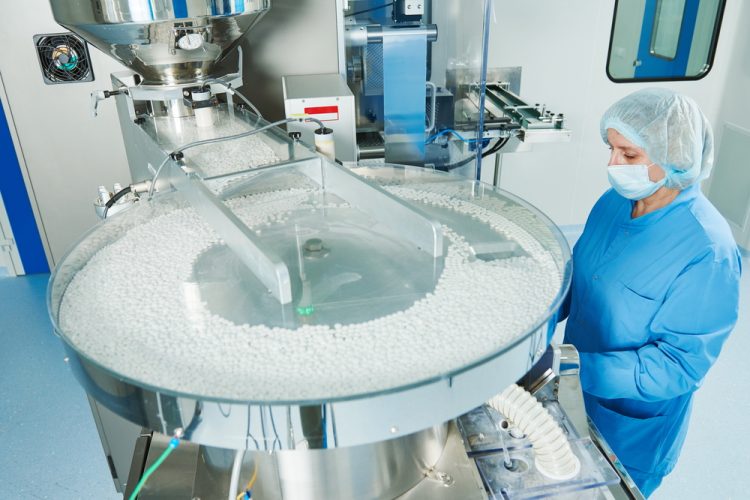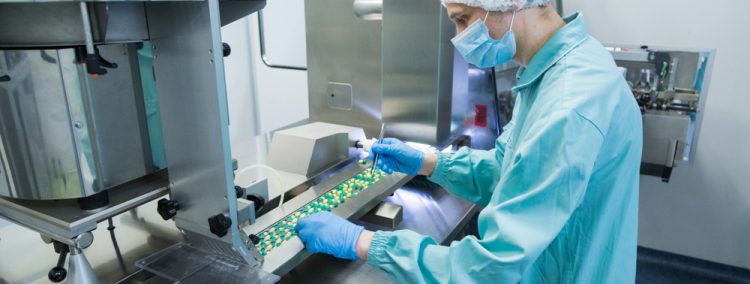The opportunities for CDMOs in the pharmaceutical industry
Posted: 11 May 2020 | Victoria Rees (European Pharmaceutical Review) | No comments yet
A PricewaterhouseCoopers report has highlighted the directions that the growth of the contract development and manufacturing organisation (CDMO) outsourcing market will take in the near future.


A report from PricewaterhouseCoopers (PwC) has summarised the global contract development and manufacturing organisation (CDMO) market, suggesting that there are a wide range of opportunities presented by the advances and changes in the pharmaceutical industry.
As quoted in the report, the CDMO market is expected to be worth $158 billion by 2025, increasing from $99 billion in 2018. This gives the market a predicated compound annual growth rate (CAGR) of 6.9 percent,1 indicating it will see a strong and persistent growth over the next five years. The ability for large pharmaceutical companies to rely on outsourced facilities and smaller companies with a lack of in-house production sites has provided the CDMO market the opportunity to flourish.
According to the authors of the report, “while the industry as a whole is thriving, many CDMOs are finding themselves confronted with unprecedented changes.” Here, we explore the opportunities and challenges faced by CDMOs in the current climate.
The growth of the outsourcing market
…CDMOs will have many opportunities to grow in the coming years, meaning that outsourcing will becoming ever more prevalent”
According to the researchers from PwC, the “strong growth” observed in the CDMO sector over recent years is due to an increasing global population, better insurance coverage in developing countries and ageing populations in industrialised countries requiring more medication. Another potential reason for this progress presented by the report is that there is an increasing willingness among pharmaceutical companies to engage with outsourcing services.
The main region of growth is the Asia Pacific region – specifically China and India. The researchers suggest that this is due to “considerably lower” manufacturing costs than in areas such as North America and Europe and more favourable regulations.
However, the US is the main country for pharmaceutical development outsourcing, mainly due to the number of research organisations available, such as university-affiliated pharmaceutical research clusters. Other issues relating to quality, logistics, regulations and intellectual property rights make developing countries a less attractive option for pharmaceutical development outsourcing.
Although solid dosage forms remain the largest formulation segment, the report states that sterile liquids are filling an increasingly large share of the CDMO market. The rise of biologics is reportedly a main driver of this growth.


Mergers and acquisitions (M&As)
Although the report says that the outsourcing industry market is characterised by fragmentation, it highlights that many CDMO M&As have taken place over the last three years. As the top five CDMOs account for roughly 15 percent of the overall market,2 there is plenty of room for smaller businesses to make deals.


For example, the largest M&A in the CDMO sector between 2016 and 2019 was the deal between Thermo Fisher Scientific and Patheon, the former of which acquired the latter for $7.2 billion. However, the largest deal between exclusively CDMOs was in 2016, with Lonza’s acquisition of Capsugel for $5.5 billion.
Other notable M&As include Thermo Fisher’s acquisition of Brammer Bio for $1.7 billion in 2019 and Carlyle’s acquisition of AMRI in 2017 for $1.5 billion.
Although M&As offer opportunities for CDMOs to grow and expand, the report says that they need to be considered carefully before agreements are made; a failed acquisition can threaten even the most successful businesses, of both parties involved. Furthermore, as the funding required for an investment into another CDMO often requires more equity capital than a CDMO generally has at its disposal, relying on external funding can also threaten the independence of the company.
The future of outsourcing
The opportunities presented by the CDMO industry include technological advancements, new operational techniques, higher company values and high profitability in a consolidated market, according to the report.
“Given the increasing number of complex and high-potency compounds, CDMOs can stand out through advanced technology and specialised expertise,” write the authors.
Despite this, the report also describes the risks of the CDMO industry as a lack of skilled labour, a reliance on a small number of customers and increasing regulation, among others. Furthermore, the more M&As that take place in the CDMO sector, the tougher the market is for smaller firms that are then unable to survive in such a competitive landscape.


One approach highlighted by the report as a potential lucrative differentiation strategy is for CDMOs to pay attention to smaller firms that wish to engage in business, rather than focusing on larger pharmaceutical companies.
Summary
The report concludes that CDMOs will have many opportunities to grow in the coming years, meaning that outsourcing will becoming ever more prevalent – especially for the manufacture of sterile liquids, a market predicted to continue growing at a higher pace than other formulation markets.
The authors also suggest that the M&A trend will continue, across a wide range of company sizes, but that deals should be carefully considered and planned before any agreements are made.
References
Report: Pwc.de. 2020. [online] Available at: https://www.pwc.de/de/gesundheitswesen-und-pharma/studie-pharma-cdmo-market.pdf [Accessed 4 May 2020].
- Grandviewresearch.com. 2020. Pharmaceutical Contract Manufacturing/Contract Research Market Report, 2025. [online] Available at: https://www.grandviewresearch.com/industry-analysis/pharmaceutical-contract-manufacturing-market [Accessed 4 May 2020].
- outsourcing-pharma.com. 2020. Less Is More: Significant CDMO Consolidation Expected As Pharma Looks To Work With Fewer Suppliers. [online] Available at: https://www.outsourcing-pharma.com/Article/2018/10/22/Top-5-CDMOs-hold-15-of-the-market-as-industry-consolidation-is-expected-to-continue [Accessed 4 May 2020].
Related topics
Contract Manufacturing, Contract Research Organisations (CROs), Drug Development, Drug Manufacturing, Manufacturing, Outsourcing, Production
Related organisations
AMRI, Brammer Bio, Capsugel, Carlyle, Lonza, Patheon, PricewaterhouseCoopers (PwC), Thermo Fisher Scientific









